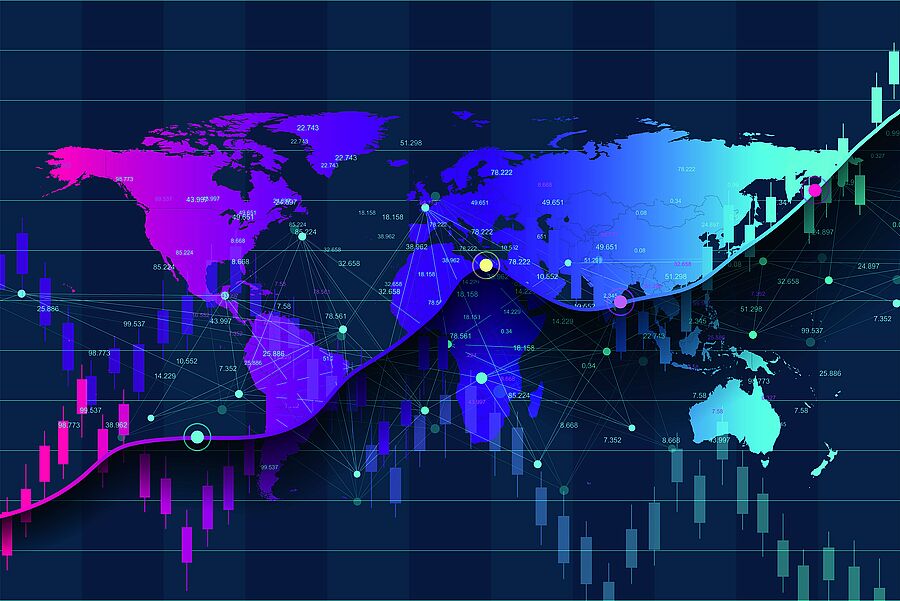Transformation of energy markets and energy infrastructure
Designing a climate-neutral energy system requires a comprehensive transformation of energy markets and energy infrastructure. The AIT Austrian Institute of Technology develops innovative solutions to enable the integration of renewable energy sources, assess sectoral and cross-sectoral, system-wide impacts of the energy transition, and derive clear policy recommendations.
Evolving energy markets
Energy markets face significant challenges. The integration of renewable energy sources, including electricity, heat, and gas, as well as the utilization of hydrogen, requires flexible and efficient market solutions.
Our Focus Areas
AIT is dedicated to:
- Integration of renewable energy into energy supply systems (electricity, gases, hydrogen, heat).
- Sectoral impacts of the energy transition on industries, businesses, and other sectors.
- Future market design: Developing and optimizing market mechanisms for flexibility use and generation control.
- Energy price forecasting: Producing precise short- and medium-term forecasts to evaluate market opportunities.
- Cost-benefit analyses: Scientific assessments of the economic viability of new technologies and business models.
Through these analyses, AIT establishes a scientific foundation for shaping future-proof energy markets and contributes to the development of sustainable solutions.
Energy infrastructure policy
A successful energy transition requires a robust and flexible energy infrastructure that meets the demands of a climate-neutral energy system.
Our Areas of Focus
AIT develops solutions for:
- Integration of renewable energy into existing networks (renewable electricity, gases, hydrogen, heat).
- Decarbonization of the economy: Planning and development of hydrogen networks, CO₂ networks, and storage systems.
- Assessment and modeling of costs and incentive systems to support infrastructure planning.
- Scenario development: Creating future models that illustrate what a climate-neutral energy system might look like.
- Impact analysis: Quantitative and qualitative evaluation of how innovative technologies and solutions influence CO₂ emission reductions and the economic system, providing a foundation for policymaking.
- Evaluating the impacts of the energy transition on various sectors, including industry, businesses, and public infrastructures.
Energy infrastructure for industry
Industry is a central part of the economic system and plays a key role in the energy transition. AIT offers solutions for modernizing energy infrastructure in industrial applications.
AIT Focus Areas
- Integration of hydrogen technologies into industrial processes to achieve decarbonization.
- Storage solutions to enhance energy supply flexibility and reduce peak loads.
- Development of scenarios for transitioning to climate-neutral production processes.
- Optimization of energy flows using digital tools and modeling approaches.
With these solutions, AIT provides a technological and scientific foundation for sustainable industrial infrastructure.
Infrastructure Challenges in Energy Supply Systems
The future of energy supply relies on flexible and resilient infrastructure. AIT develops concepts for:
- Grid integration of renewable energy to stabilize electricity networks.
- Development of storage and transport systems for energy carriers such as hydrogen, heat, batteries, and CO₂.
- Digital modeling and optimization of energy systems.
A particular focus is placed on cost assessment and the modeling of support and incentive systems to facilitate investments in energy infrastructure.
AIT works on innovative solutions across various areas to support the expansion of energy infrastructure:
- Renewable heat networks for cities and municipalities.
- Modern electricity grids for urban and rural areas.
- CO₂ and hydrogen transport networks to enable the decarbonization of entire industries.
Energy Price Forecasts and Cost-Benefit Analyses of Energy-Related Business Models
A solid economic assessment is essential for achieving climate neutrality. AIT offers:
- Short- and medium-term energy price forecasts to support strategic decision-making for businesses and policymakers.
- Cost-benefit analyses to evaluate new technologies and business models.
- Market design and flexibility utilization: Developing concepts for the optimal use of energy storage systems and grids.
Through precise analyses, AIT provides the foundation for investments and policy decisions that enable the transition to a climate-neutral energy system.
Recommendations for Policy and Business
Based on comprehensive analyses, AIT derives clear, scientifically grounded recommendations tailored to:
- Public clients and ministries.
- Policymakers and regulatory authorities.
- Companies and investors.
AIT’s findings provide a reliable basis for defining policy support and incentive systems that accelerate the transition to a climate-neutral future.
Circular Economy in the Energy Market
The circular economy is a vital component of the energy transition, conserving resources, minimizing waste, and increasing energy efficiency. For example, waste heat from industrial processes or biomass can be used for energy generation. This not only reduces the demand for primary raw materials but also contributes to decarbonization and supports the energy transition. A functional circular economy in the energy sector fosters sustainable innovation and paves the way for a climate-neutral future.
AIT supports companies and institutions in developing circular business models through:
- Energetic Analyses: Evaluation of processes, products, and buildings regarding their carbon footprint and circularity using life cycle assessment.
- Modular Design: Development of circular, modular designs for technologies, products, and buildings using innovative tools.
- Economic Evaluation Models: Analyses to identify new markets, technologies, and products.
- Digital Solutions: Digital twins for inventory and modeling of energy, raw material, and land use scenarios.
- Logistics and Recycling Concepts: Optimization of material flows in complex systems such as buildings, industries, and cities.
- Asset Management: Life cycle cost optimization for efficient resource utilization.
- Circular Adaptation Strategies: Development of sustainability strategies, roadmaps, and indicator systems for circular economy monitoring.
- Analysis of Alternative Resources: Assessment of raw material sources through urban and industrial mining.
- Investment Support: Evaluation of investments and business activities in accordance with the EU Taxonomy Regulation.
- Policy Recommendations: Deriving recommendations for research, innovation, and technology to promote the circular economy.



